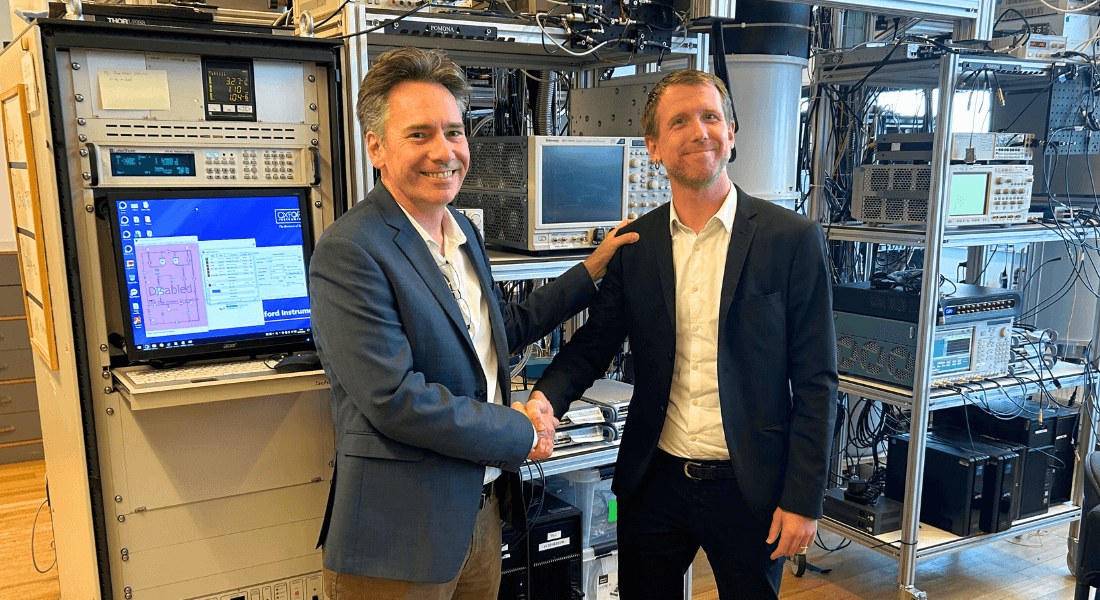University of Copenhagen and MIT Join Forces for Transatlantic Research in Quantum Computing
Quantum computers have the potential to change the world. A new collaboration between Novo Nordisk Foundation Quantum Computing Programme at University of Copenhagen and Engineering Quantum Systems group at the renowned American university MIT hopes to accelerate research in the development of advanced quantum computers.

Quantum research at UCPH is crossing the Atlantic. Researchers at the Niels Bohr Institute have signed a 4-year collaboration agreement with world leading quantum researchers at the renowned Massachusetts Institute of Technology (MIT) in Boston, USA. Researchers and students at both universities will join forces to try and solve the biggest quantum puzzles that continue to challenge researchers worldwide in the race to develop fault tolerant quantum computers. These new supercomputers, with unprecedented computational power for certain problems, have the potential to solve some of the universe's greatest mysteries.
"This is an enormous recognition of our work at UCPH. Prof. Oliver’s team at MIT is part of the international top echelon of quantum computing research. This project enables Danish research in quantum computing hardware to learn from the best as we collaborate on developing hardware for next generation fault-tolerant quantum computing. I have previously had the pleasure of working closely with Prof. Oliver, and with this ambitious investment from the Novo Nordisk Foundation Quantum Computing Programme, we are able to push our joint research to a new level,” says Morten Kjaergaard, Associate Professor of Quantum Information Physics, Villum Young Investigator and research group leader at the Niels Bohr Institute at UCPH.
Identical Laboratory setups
MIT’s Research Laboratory of Electronics (RLE) also sees immense potential in this joint research. The agreement entails building two identical quantum laboratory setups—one at UCPH and one at MIT—both financed by the Novo Nordisk Foundation Quantum Computing Programme. This initiative lets the two universities continuously collaborate to develop research into fault tolerant quantum computers, as well as exchange know-how, software, and students. According to William Oliver, who is the Associate Director of the RLE, the Henry Ellis Warren (1894) Professor within the Department of Electrical Engineering and Computer Science, a Professor of Physics, and the head of the Center for Quantum Engineering at MIT, the collaboration opens exceptional opportunities.
"To realize the promise of quantum computing, we must learn how to build systems that are robust, reproducible, and extensible. This unique program enables us to innovate faster by exchanging personnel and ideas, running parallel experiments, and comparing results. Even better, we get to continue working with Prof. Kjaergaard, a rising star in the field, and his team in Copenhagen. This is the way," says Prof. Oliver.
The joint project is not only attracting attention in the academic world. The American Ambassador to Denmark, Alan Leventhal, also praises the new collaboration.
Copenhagen is an epicenter for quantum research
"This collaboration showcases how strong international relationships drive research forward. Copenhagen is an epicenter for quantum research, and forming key partnerships with U.S. institutions like MIT is a great step for further development of the Danish quantum ecosystem," says Ambassador Leventhal
This collaboration with MIT follows several years of significant investments in the quantum field in Denmark. In 2022, NATO opened a quantum center at the University of Copenhagen, and the new collaboration between UCPH and MIT takes place under the Novo Nordisk Foundation Quantum Computing Programme, which was established in 2023 with a grant of 1,5 billion Danish kroner from the Novo Nordisk Foundation.
An attractive partner
The program, based at the Niels Bohr Institute, has a mission to enable the development of fault tolerant quantum computing hardware and quantum algorithms that solve life-science relevant chemical and biological problems.
"This collaboration is the result of nearly a decade of focused efforts to attract and train world-class researchers. Today, we are an attractive partner for foundations, organisations, and, as in this case, one of the world's best universities. That makes me proud," says the Rector of the University of Copenhagen Henrik C. Wegener.
